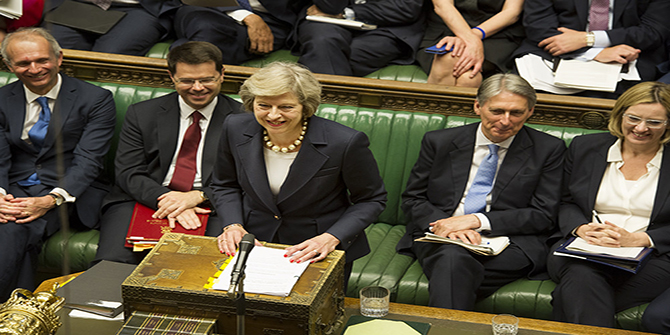
 Prime Minister’s Questions is one of the most public venues for MPs to express their opinions and represent the views of their constituents. But can opposition parties and backbenchers – MPs who hold no governmental office and are not a spokesperson in the Opposition – drive the content of such questions? Shaun Bevan and Peter John address this by looking at questions between the start of the Labour government in 1997 and the end of 2008. They find that no area was dominated by either the government or opposition, and that the Conservative backbench led frontbench questions.
Prime Minister’s Questions is one of the most public venues for MPs to express their opinions and represent the views of their constituents. But can opposition parties and backbenchers – MPs who hold no governmental office and are not a spokesperson in the Opposition – drive the content of such questions? Shaun Bevan and Peter John address this by looking at questions between the start of the Labour government in 1997 and the end of 2008. They find that no area was dominated by either the government or opposition, and that the Conservative backbench led frontbench questions.
Prime Minister’s Questions (PMQs) in the UK attracts an international audience who relish in the fierce onslaught of questions and insults directed at the Prime Minister – and in seeing the Prime Minister wriggle out of difficult issues while trying to gain the upper hand. Now occurring weekly when parliament is in session, PMQs was originally intended as a means of challenging the government from the backbench and the opposition.
Institutionally and practically PMQs are designed with the opposition in mind, with a set number of questions being asked by the opposition leaders. Yet PMQs serve a second, often even more marginalised group than the opposition: backbenchers themselves. The relationship between the frontbench and backbench is often debated, but has also been steadily eroded through reforms such as the select committee system and presumably PMQs. Opposition questions, which can come from both their frontbench – the opposition leader(s) and shadow cabinet(s) – as well as the backbench, have their own agenda with a noticeable level of agenda-setting power laying with backbench MPs.
However, the power of backbenchers is moderated by opposition party structures and sizes. Smaller, more focused opposition parties are more likely to lead from the front on PMQs. This is because the party’s goals are generally more coherent than the catch-all parties that Labour and Conservative have become, especially in the recent past. Our research takes an in depth look at these arguments to consider how front and backbenchers from the government and opposition drive the content of one another’s questions, using data we gathered as part of the UK Policy Agendas Project on all PMQs – 9,062 questions – between the start of Labour government in 1997 to the end of 2008.
The figure consists of 19 separate graphs, showing the percentage of questions asked by the government out of all questions asked for each major topic or issue as determined by the UK Policy Agendas Project codebook. Across all issues there is a noticeable level of variation indicating that no area is completely controlled by the government (indicated by a “1”) or opposition (indicated by a “0”), at least not for long. However, there are also some issues that are more heavily focused on by the opposition. The most notable of these are the stronger opposition focus on the economy, a common point of critique for oppositions globally, and defence which especially after the invasion of Iraq remained a major point of criticism during Labour’s remaining tenure. Most notably for government questions, an often recurring area was labour, perhaps unsurprising given the very name of the party in power, but also the environment, energy and even commerce would dominate the agenda, at least for a short while.
While the figure offers interesting insights into the content of PMQs on its own, we also conducted more advanced statistical analyses to unpack the relationship between the government and opposition and within opposition parties as suggested by theoretical expectations. Using both public priorities measured by Ipsos MORI’s issues index, and media attention as captured by the front page of the Times (London) on the day of each PMQs session, the different statistical models provided a consistent account of our expectations. These include a strong positive effect for opposition questions on government questions, but not the reverse. There was clear evidence that the backbench of the Conservative party led frontbench questions, but not the reverse. Findings also indicated the potential discounting of backbench questions for the Liberal Democrat frontbench. And finally, that the content of government questions during this period was most responsive to the Conservative backbench and the Liberal Democrat frontbench, with no discernible effect for the other half of each party (see tables 2-5 here).
Like them, hate them, laugh at them or simply ignore them, PMQs remain somewhat unique in their ability to not only lead to a response by the Prime Minister, but in the ability of the opposition, including backbenchers, to drive content. As a political agenda, PMQs can force the government to respond to issues it might wish to ignore or to simply direct the agenda in a new direction.
___
Read more about the research from which the above article draws on here here.
 Shaun Bevan is Lecturer in Quantitative Political Science at the University of Edinburgh. His work has appeared in such journals as Comparative Political Studies, the European Journal of Political Research, the European Political Science Review, the Journal of European Public Policy, Political Research Quarterly, Policy Studies Journal and Public Administration.
Shaun Bevan is Lecturer in Quantitative Political Science at the University of Edinburgh. His work has appeared in such journals as Comparative Political Studies, the European Journal of Political Research, the European Political Science Review, the Journal of European Public Policy, Political Research Quarterly, Policy Studies Journal and Public Administration.
 Peter John is Professor of Political Science and Public Policy at UCL. His books include “Analysing Public Policy” (Routledge, 2nd edition, 2012) and “Making Policy Work” (Routledge 2011).
Peter John is Professor of Political Science and Public Policy at UCL. His books include “Analysing Public Policy” (Routledge, 2nd edition, 2012) and “Making Policy Work” (Routledge 2011).








2 Comments